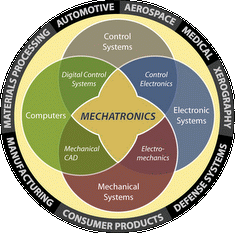 Computer programmers make a little less than mechanical engineers.
Computer programmers make a little less than mechanical engineers.
Comstock/Comstock/Getty Images
If you have a knack for science and math, either mechanical engineering or computer programming could satisfy you on the job. But beyond their technical bent, the two can be quite different. Mechanical engineers invent new products, while computer programmers use electronic languages to write new software. You'll need varying levels of education to enter either field, though the skills sets, pay and job outlook are all similar.
Job Description
They’re both science-oriented jobs, but that’s about all mechanical engineering and computer programming have in common as far as job description. Mechanical engineers design new devices or materials for countless uses in areas ranging from medicine to aerospace. They might draw up plans for a new hip-replacement joint, build satellites or create wind turbines or solar panels. Programmers, on the other hand, write detailed instructions in electronic languages or codes to help computers complete operations. After they write code, programmers test their work. They also maintain existing programs.
Education
If you want to start your career quickly, computer programming may be the way to go. That’s because programmers typically need less education to land their first job. Numbers from the U.S. Department of Labor show that 78 percent of programmers had a bachelor’s degree as of 2012. Eleven percent had some college, but no degree, while 6 percent had a high school diploma. (See Reference 3) Among mechanical engineers, an associate degree was the lowest educational level achieved, while 29 percent had a master’s degree. (See Reference 4) To become a computer programmer, you can begin with an associate degree, taking courses in programming basics, network design, computer architecture, project management and math. (See Reference 5) Aspiring mechanical engineers should get a bachelor’s in the field, with classes in chemistry, physics, calculus, computer-aided design, thermodynamics and materials. (See Reference 6)
Related Reading: Types of Computer Programmers
Skills
Working in either field requires many of the same skills. Both professionals need great communications skills, because they have to be able to discuss projects in writing and verbally with other members of their team. Math skills are also essential. Programmers typically use more basic math, such as simple algebra or financial calculations, while mechanical engineers often work with complex math equations. Both need logic and analytical skills to solve problems. But there’s one skill set that’s more important in programming: computer capabilities. Programmers need some familiarity with computer languages before they even set foot in a college classroom.












 Mechatronics is the combination of Mechanical engineering, Electronic engineering, Computer engineering, Software engineering, Control engineering, and Systems Design engineering in order to design and manufacture useful products. Mechatronics is a multidisciplinary...
Mechatronics is the combination of Mechanical engineering, Electronic engineering, Computer engineering, Software engineering, Control engineering, and Systems Design engineering in order to design and manufacture useful products. Mechatronics is a multidisciplinary...
 The College of Engineering at the University of Illinois at Urbana–Champaign was first established in 1868, and is considered one of the original units of the school. The presence of a steam engine on the University's seal is a good clue as to the importance of the...
The College of Engineering at the University of Illinois at Urbana–Champaign was first established in 1868, and is considered one of the original units of the school. The presence of a steam engine on the University's seal is a good clue as to the importance of the...